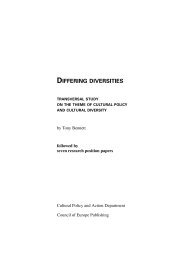Why we need European cultural policies: the impact of EU ...
Why we need European cultural policies: the impact of EU ...
Why we need European cultural policies: the impact of EU ...
You also want an ePaper? Increase the reach of your titles
YUMPU automatically turns print PDFs into web optimized ePapers that Google loves.
The first one is a `macro’ dimension <strong>of</strong> policy, which aims to determine <strong>the</strong> general goals andparameters <strong>of</strong> different <strong>policies</strong>. The o<strong>the</strong>r dimension consists <strong>of</strong> determining <strong>the</strong> specific detailsand contents <strong>of</strong> <strong>the</strong>se macro <strong>policies</strong>. In designing this policy, which Sedelmeier called `mesapolicy’ – it is necessary to have <strong>the</strong> active involvement <strong>of</strong> experts in specific policy fields, who cantranslate <strong>the</strong> goals <strong>of</strong> macro policy into concrete policy measures and instruments.In order to translate general priorities into concrete policy instruments, it is necessary not only todecide what instruments to apply but also how and when to apply <strong>the</strong>m. This entails an extremelycomplex process <strong>of</strong> decision-making that has to simultaneously take into account different policyareas. In o<strong>the</strong>r words, this `macro’ policy consists <strong>of</strong> a series <strong>of</strong> `mesa’ <strong>policies</strong> that are in factdefining <strong>the</strong> content <strong>of</strong> <strong>policies</strong> and enabling <strong>the</strong> monitoring <strong>of</strong> <strong>the</strong> results <strong>of</strong> <strong>the</strong>ir application(Sedelmeier in Wallace and Wallace ibid).If <strong>we</strong> apply this division to our field <strong>of</strong> interest, it is possible to argue that, in <strong>cultural</strong> policy, <strong>the</strong><strong>European</strong> Union did not have a clear vision <strong>of</strong> a `macro’ level <strong>of</strong> policy which made it impossibleto design `mesa’ <strong>policies</strong>. Numerous studies <strong>we</strong>re undertaken on <strong>the</strong> <strong>impact</strong> <strong>of</strong> <strong>the</strong> enlargementon a whole range <strong>of</strong> <strong>policies</strong>, both in old and new member states,19 to anticipate positive andnegative consequences and eventually to suggest measures that could directly influence <strong>the</strong>irconsequences. Even though <strong>the</strong>re has been more intense discussion about <strong>cultural</strong> aspects <strong>of</strong>enlargement during <strong>the</strong> last decade, <strong>the</strong>re have been no studies assessing overall changes in<strong>cultural</strong> <strong>policies</strong> occurring as a consequence <strong>of</strong> enlargement, nor has <strong>the</strong>re been much debateabout a specific methodology that could be used for this type <strong>of</strong> research.Wallace described five major challenges to research into policy-making processes in <strong>the</strong><strong>European</strong> Union and evoked Puchala’s famous article 20 about researching <strong>European</strong> integration(Wallace H, in Wallace and Wallace [2000]).The first research challenge is to avoid <strong>the</strong> trap <strong>of</strong> forming general conclusions by mechanisticallyapplying methods arising from <strong>the</strong> analysis <strong>of</strong> one sector to all o<strong>the</strong>rs. Ano<strong>the</strong>r is to resist <strong>the</strong>tendency to simplify <strong>policies</strong>, both at <strong>EU</strong> and national level, in order to make it easier to compare.The next challenge is to <strong>the</strong> researchers and <strong>the</strong>ir skills; <strong>the</strong>y should not limit <strong>the</strong>mselves toonly one research tool but should be prepared to use a range <strong>of</strong> methods. The fourth possiblechallenge is to be able to clearly distinguish bet<strong>we</strong>en research into <strong>European</strong> integration asa broad phenomenon and research into policy-making within <strong>the</strong> <strong>European</strong> Union. The finalchallenge calls for an ability to assess <strong>the</strong> vast policy-making process even as it is continuouslychanging and developing.Wallace suggested that research into <strong>the</strong> policy-making process in <strong>the</strong> <strong>European</strong> Union could bebased on at least three disciplines: international relations, comparative policy and policy analysis(Wallace ibid). It is clear that all three fields <strong>of</strong> study can be applied to research into <strong>the</strong> <strong>impact</strong> <strong>of</strong>enlargement on culture.26Part 1 The conceptual frame <strong>of</strong> <strong>the</strong> study














